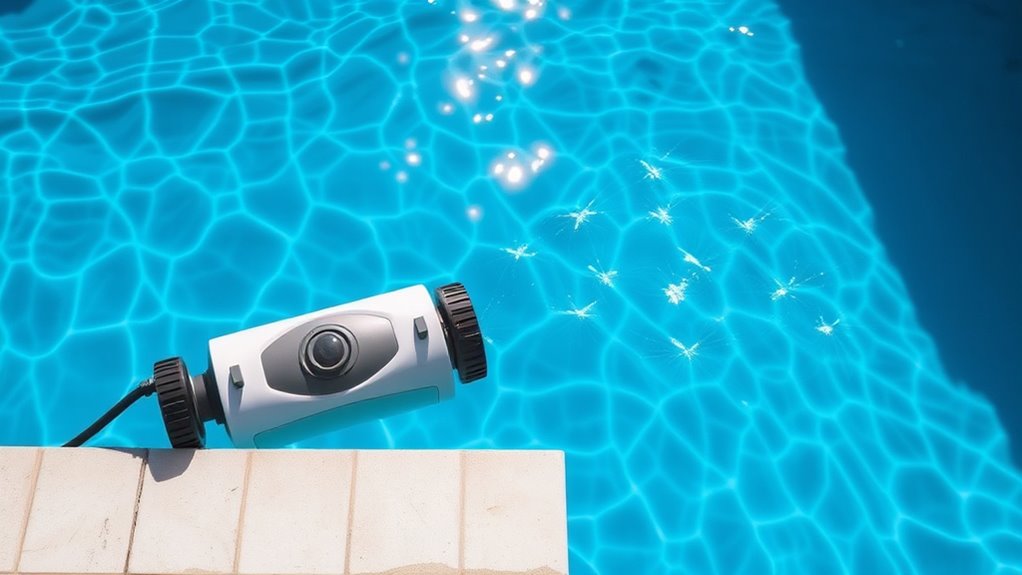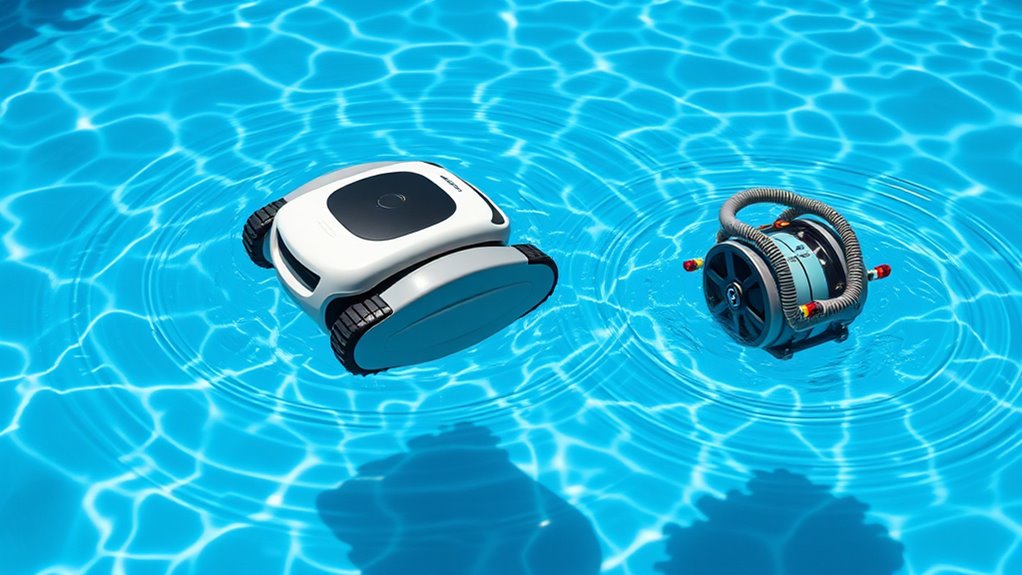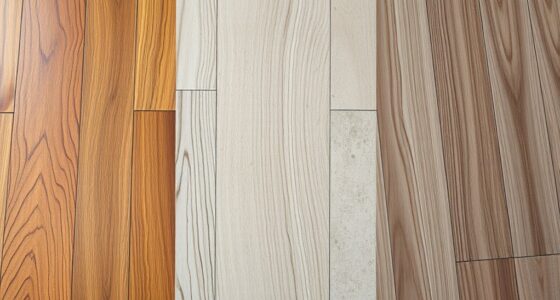Pressure pool cleaners are energy-efficient because they use your existing pool pump, and they require less maintenance thanks to their simple design. Robotic cleaners run independently, offer better cleaning for a variety of surfaces, and use smart features for remote control, but they may cost more and need regular cleaning of internal parts. To choose the best option for your pool, consider your priorities for energy savings, maintenance, and cleaning quality—more details follow.
Key Takeaways
- Pressure cleaners use existing pool pump energy, while robotic cleaners have dedicated motors for independent operation.
- Robotic cleaners typically offer more thorough, targeted cleaning but may require more maintenance.
- Pressure cleaners are simpler, low-maintenance, and rely on pool filtration systems, whereas robotic models are more complex.
- Robotic cleaners often feature smart technology for remote control and scheduling, unlike pressure cleaners.
- Cost and energy efficiency vary; pressure cleaners are usually cheaper and use less energy, but robotic cleaners provide higher cleaning precision.

When choosing a pool cleaner, understanding the differences between pressure and robotic models is vital, as each type offers distinct advantages and limitations. One of the key aspects to contemplate is energy efficiency. Pressure pool cleaners typically rely on your existing pool pump to operate, which means they use energy already being consumed for filtration. While they don’t require additional power sources, their energy efficiency can vary based on how your pump is set up. If your pump runs frequently or is particularly powerful, pressure cleaners may not add much extra energy cost, but if your pump runs inefficiently or is oversized, it could lead to higher energy bills. Robotic pool cleaners, on the other hand, operate independently of your pool’s filtration system, powered by their own electric motors. Although they often consume more energy during operation, they are usually designed to be energy-efficient by cleaning more thoroughly and quickly, reducing overall run time. If energy conservation is a priority for you, robotic cleaners with programmable schedules and adjustable settings can help maximize power use, saving you money in the long run. Additionally, advancements in robotic cleaner technology have led to models with energy-efficient motors that further reduce power consumption without sacrificing cleaning performance. Moreover, some robotic cleaners feature smart technology that allows remote monitoring and control, enhancing convenience and further optimizing energy use. Using smart technology in robotic cleaners can also help detect maintenance issues early, preventing unnecessary energy waste and prolonging the device’s lifespan. Proper maintenance of the entire system, including filters and sensors, ensures optimal energy use and prolongs the lifespan of your pool cleaning equipment. In addition, considering cost-effectiveness can help determine which model offers the best balance between initial investment and ongoing expenses. Maintenance requirements also play a vital role in your decision. Pressure cleaners tend to be simpler in design, with fewer moving parts, which generally means less maintenance. They often have hoses and simple filter bags that are easy to clean and replace. However, because they rely on your pool’s pump, any issues with your pump can impact their performance, and you might need to perform regular checks to ensure the system’s peak function. Robotic cleaners, while more sophisticated, require regular maintenance of their internal brushes, filters, and sensors. Their electronic components can be more vulnerable to damage from debris or water intrusion, meaning you’ll need to clean and inspect them more frequently. That said, robotic cleaners often come with self-cleaning features or filter systems that are easy to access and service, reducing the overall effort required for upkeep. When considering maintenance, it’s also worth noting that robotic cleaners typically have self-cleaning features, which can extend their lifespan and reduce the need for manual cleaning. Regular upkeep of these features ensures optimal performance and longevity of your robotic cleaner, ultimately saving you time and money. Additionally, choosing models with easy-to-access filters can streamline maintenance routines. In weighing these factors, you’ll want to consider how much time you’re willing to spend on maintenance, your existing pool equipment, and your energy conservation goals. Pressure cleaners may appeal if you prefer a low-maintenance, straightforward option that integrates with your current system, but they might not offer the same level of cleaning precision as robotic models. Conversely, robotic cleaners might demand a bit more attention but can deliver superior cleaning results with targeted, thorough scrubbing. Ultimately, knowing how each type performs in terms of energy efficiency and maintenance helps you make an informed choice that aligns with your budget, convenience, and cleaning needs.
Frequently Asked Questions
Which Pool Cleaner Is More Energy-Efficient Overall?
When choosing a pool cleaner, you want to think about energy consumption and environmental impact. Generally, robotic pool cleaners are more energy-efficient because they use less power and operate autonomously, reducing overall energy use. They often have programmable features, saving electricity over time. In contrast, some pressure pool cleaners may consume more energy due to their continuous operation. So, for better efficiency and a smaller environmental footprint, robotic cleaners are typically the better choice.
Can Pressure and Robotic Cleaners Be Used Together?
Imagine you want a spotless pool with minimal effort. Using a hybrid cleaning approach, you can combine pressure and robotic cleaners for enhanced efficiency. For example, a homeowner uses a robotic cleaner for detailed scrubbing while a pressure cleaner handles heavy debris. This combined efficiency reduces cleaning time and energy use. Yes, you can use both together, creating a hybrid cleaning system that maximizes pool cleanliness and saves you money.
How Long Does Each Cleaner Type Typically Last?
You wonder how long each cleaner type lasts. Typically, pressure cleaners last around 3-5 years, depending on usage and maintenance, while robotic cleaners tend to last 5-7 years due to their advanced technology and durable parts. When it comes to cleaning efficiency, robotic cleaners often outperform pressure ones. The durability comparison shows robotic models usually have a longer lifespan, making them a worthwhile investment if you seek consistent, efficient pool cleaning.
Are Robotic Cleaners Suitable for All Pool Sizes and Shapes?
Robotic cleaners are generally suitable for most pool sizes and shapes thanks to their shape flexibility and adaptable navigation systems. You’ll find they work well in both small and large pools, handling complex shapes with ease. However, very large or uniquely designed pools might require a more powerful or specialized model. Overall, robotic cleaners offer versatile cleaning solutions, making them a great choice for maintaining a variety of pool sizes and shapes efficiently.
What Maintenance Is Required for Each Type of Cleaner?
You need to regularly maintain your pool cleaners to keep them working efficiently. For robotic cleaners, you’ll want to clean or replace filters and check the motor servicing as needed. Pressure cleaners require filter maintenance and inspecting hoses for leaks or blockages. Both types benefit from routine cleaning, checking for wear and tear, and ensuring their brushes or wheels are in good condition, so your pool stays spotless.
Conclusion
When choosing between pressure and robotic pool cleaners, remember—you’re not just maintaining a pool; you’re elevating your entire backyard oasis to a domain of unparalleled perfection. Pressure cleaners might be powerful, but robotic ones bring a futuristic, almost magical touch to effortless cleanliness. Whichever you pick, you’re stepping into a world where dirt trembles at your command, and your pool remains the sparkling jewel of your outdoor sanctuary—an achievement that’s nothing short of legendary.








